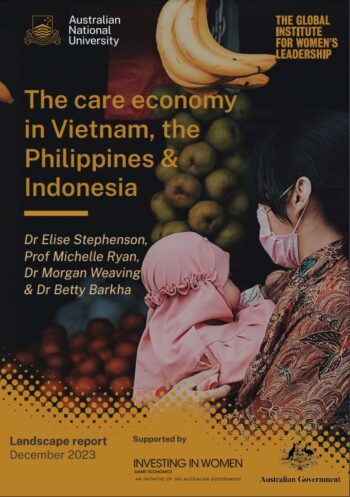Summary
This landscape study provides an overview of the care economy in Vietnam, the Philippines and Indonesia. It examines definitions of the care economy in each of the three countries and analyses key topics and findings from existing literature on the care economy. It also studies forums where care is discussed, the way care is discussed, and key actors who are carrying out work related to the care economy in the region. Lastly, the report identifies key research, policy and practice gaps that present opportunities to drive change.
The study focused on the core case studies in the three countries, as well as on literature from the Southeast Asian region and the global literature to analyse for gaps/opportunities and trends.
This study is published by the Global Institute for Women’s Leadership at the Australia National University, with support from Investing in Women.
Highlights
- Definitions of care and care systems remain under-developed, limiting the ability of countries to set policy and share common learnings.
- Women bear a disproportionate burden of unpaid care, which limits their ability to participate in the workforce. Care workers across Vietnam, the Philippines and Indonesia face low pay and poor working conditions, which impacts how informal carers are treated.
- There lacks a baseline mapping of care interventions and opportunities, including assessing effectiveness and experiences in the care economy.
- Interventions need to target structural and organisational impacts for systemic gains. It is also critical to embed intersectionality and sensitivity for historical precedents, cultural and religious norms.
- Four main actors involved in the provision of care and related research, policies and interventions are: government, non-government organisations (NGOs), international organisations, and the private sector.
- Key research, policy and practice gaps that present opportunities to drive change include: shifting social norms, working with organisations to establish standards, encouraging government policy change, and supporting individuals.
Download Resources Here


